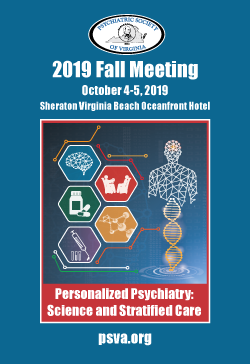Summer 2019 Issue |
|
American Psychiatric Association Assembly Meeting
May 2019
By John P.D. Shemo, MD, DLFAPA
Do you have an issue or concern for the APA? Please contact Dr. John Shemo, [email protected], or Dr. Adam Kaul, [email protected] or Dr. Varun Choudhary, [email protected] and see if they believe a white paper should be submitted to the APA Assembly.
Adam Kaul and I were accompanied at the May APA Assembly Meeting in San Francisco by Susan Waller functioning as a substitute for Varun Choudhary. She served most capably despite being somewhat hobbled by a knee problem. Her perseverance was truly admirable.
Prior to the meeting a number of action papers were posted on the Assembly list-serve which led to a lot of feedback and debate, which then led to revisions in the papers - a process very similar to what happens in the reference committees at the meeting. This was the most active use of the Assembly list-serve in this manner that I have seen. The occurrence of all this interchange seemed to “stir people up” and we thereby had the largest number of action papers submitted I have ever seen at a single meeting, 49 in total. Ironically, this occurred at an Assembly Meeting where some of our work time was diverted by the 125th anniversary of the founding of the APA ceremonies.
The actual number of papers that were presented and debated on the floor of the Assembly was, as usual, slightly diminished by a few being withdrawn and others being put on the consent calendar. The consent calendar is a list of papers that the Procedures Committee believes are so non-controversial that they would be passed unanimously. This list is distributed to all Assembly members and posted near the start of the opening session. A paper put on the consent calendar will be removed and therefore be presented and debated on the floor at the request of any single Assembly member and this does occur regularly with at least a few - this time it was seven.
I will briefly review some of the action papers and APA position statements that were addressed:
- There were two position statements passed regarding cannabis, one titled Against the Use of Cannibis for PTSD and the other titled In Opposition to Cannibis as Medicine.
- A position statement was approved regarding Civil Commitment for Adults With Substance Abuse Disorders, as there are places where this is not occurring even if the condition is imminently life threatening.
- A position statement titled Neuroscience-Based Nomenclature (NbN) Project was approved, supporting funding of such a study.
- A revision of a position statement titled Carve Outs and Discrimination was passed related to insurance entities’ use of mental health carve outs as a way to mask discriminatory practices.
- Position statements were approved addressing the issues of Universal Healthcare Coverage in the United States and on The Scope of Practice for Prescription of Medications to Psychiatric Patients.
- The Assembly voted to approve the creation of a task force to explore options to better support state level associations and district branches to have stronger PAC contributions.
- The Assembly voted to ask that the APA, through the Council on Healthcare Systems and Financing, revisit and consider revising the current position statement on Banning of Pharmacy Benefit Management Policies that Require the Provision of Dangerous Quantities of Medications and develop a paper to educate pharmacists and pharmacy benefit managers on the necessity of flexibility in the quantities of medication prescribed. This would then directly address the elimination of any requirement to prescribe 90 day supplies of psychotropic medications.
- Substance Use Disorders Are Not Social History Problems. The Assembly voted to ask that the APA lead the field of medicine to a fundamental change in the manner in which medical and psychiatric evaluations are conducted. The assessment of the substance use history should be recorded in the main body of history and physicals and documented in a prominent and accessible area of the medical record. This change needs to be reflected in APA evaluation guidelines. This practice should be encouraged with the AMA and other medical specialties and included in medical/osteopathic education and graduate medical education. This is, of course, related to the practice of many physicians of putting a review of substance abuse problems in the social history and not in the main body of their medical history.
- An action paper was approved calling for the development of a position statement that ensures that psychiatry residents and fellows are supervised by psychiatrists and not solely by mid-level practitioners, as apparently is happening in some programs.
- The Assembly approved an action paper titled Improving Public Understanding of Psychiatry. This paper asks that:
The APA shall embark on a proactive public relations and advertising campaign that informs the public about the more rigorous training and greater capabilities of psychiatrists compared to other disciplines that treat psychiatric disorders.
That this campaign shall seek to dispel the false equivalency of psychiatrists with advanced practice nurses, prescribing psychologists, and other disciplines that seek to expand their scope of practice to be equal to that of psychiatrists.That this campaign target the general public, government officials, and healthcare industry leaders with messages specific to their relationship with the profession of psychiatry.
That a plan for this campaign be presented to the Assembly at the May 2020 Assembly meeting.
- An action paper was approved which asks that the APA conduct a feasibility study to determine the cost and means of creating an alternative process to certify physicians in the specialty of psychiatry.
- An action paper was approved which asks that an APA work group be formed to prepare amendments to the Federal Opioid Treatment Standards based on current, evidence-based treatment standards.
- An action paper was approved which establishes a work group to establish a media response and talking points on Climate Mental Health Impacts.
- The Assembly passed an action paper titled APA Recommendations for Lowering Prescription Drug Prices. This paper asks:
That the APA’s Council on Healthcare Systems and Financing will develop recommendations for lowering drug prices, with attention to preserving access to all psychiatric medications without placing undue administrative burdens on physicians, and that the recommendations be presented to the APA Assembly for approval at the Fall Assembly meeting.
- The Assembly approved an action paper related to Workplace Bullying at the V.A. (Veteran’s Administration).
- An action paper was approved titled Protecting Government-Employed Psychiatrists from Political Pressure. This paper asks that the Board of Trustees convene a task force to draft a position statement defining the APA’s position in relation to demands for political allegiance by government-employed psychiatrists, and the behavior of government-employed psychiatrists in response to such demands.
- The Assembly voted to approve a paper which asks that the American Psychiatric Association endorse the AMA policy on “Advancing Gender Equity in Medicine” which supports equal pay for equal work, regardless of gender, and that the APA will actively promote such pay structures within its own organization.
- The Assembly voted to approve a paper titled Psychiatrists as Leaders which asks that the Council on Medical Education and Lifelong Learning advocate to appropriate organizations that the following requirements must apply for one to be eligible to be a department chair of psychiatry.
1. Have a medical degree.
2. Have successfully finished a psychiatry residency.
3. Have an unrestricted license to practice medicine.There is an increasing trend to have “medical directors” of psychiatric programs and even academic Departments of Psychiatry who do not meet all, or even any, of these criteria.
- An action paper was withdrawn which was titled Changing the Name of Borderline Personality Disorder. This was related in part to the tendency of some insurance entities to decrease coverage for patients with this diagnosis. This is in distinction to their willingness to increase coverage for most med/surg disorders if there are complicating co-morbidities.
This is only a partial list of the Assembly actions at this meeting. It was rather amazing that we completed the entire agenda.
As always, I will end this report with the reminder that the PSV Assembly representatives are there in the Assembly to serve the PSV membership and we are eager to hear your ideas about how the APA can best assist you and your patients.
YOUR NEWSLETTER IS NOW AVAILABLE ON YOUR SMARTPHONE AND TABLET!
JOIN PSV TODAY!
PLAN NOW!
Registration and Program Information Now Available!
PSV 2019
FALL MEETING
October 4-5, 2019
Sheraton Virginia Beach
Oceanfront Hotel
APA Find a Psychiatrist
Are you accepting new patients?
Opt into APA’s “Find A Psychiatrist” database. To view the functionality or opt-in,
CLICK HERE
FYI: A link for this option has been added to the PSV website. Select the “About” button and then “Find a Psychiatrist” from the drop down.





